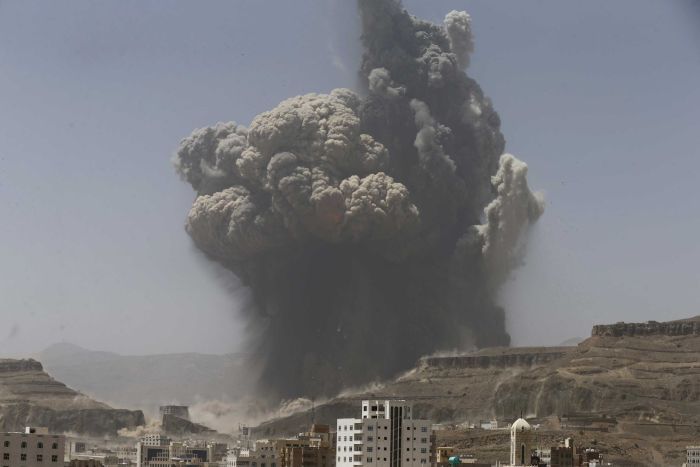Saudi Arabia Resumes Attack on Yemen
Renewed strikes in Yemen

NEW DELHI: Hours after Saudi Arabia announced that it was ending its air campaign in Yemen, fresh airstrikes pounded the war-torn country. Air strikes were reported in the port city of Aden and the central city of Taiz, as fighting broke out between Houthi rebels and pro-government forces in Aden and the city of Lahj, the capital of Huta, and the southern town of Daleh.
The renewed fighting came hours after the Saudi regime -- that has been bombing Houthi rebels since March 26 -- announced that it was ending its air campaign dubbed operation "Decisive Storm" and replacing it with a new campaign aimed at protecting civilians and preventing Houthi fighters from operating.
Brigadier-General Ahmed al-Asiri, the coalition's spokesperson made the announcement on Tuesday. Stating that the coalition had achieved its targets in Yemen, the General said that a new operation called "Renewal of Hope" was being initiated and came into effect at midnight local time. "The coalition has completed the 'Decisive Storm' campaign at the request of the Yemeni government and the president of Yemen," Asiri said… The primary goals of the campaign have been achieved and sovereignty has been protected… We are able to confirm that the Houthis are no longer a threat to Yemenis or neighbouring countries,” Asiri said.
Yemen's Saudi and US-backed President Abd-Rabbu Mansour Hadi made a televised speech early Wednesday from Riyadh, where he thanked the coalition for its support. "I extend on my behalf and on behalf of the Yemeni people sincere thanks and appreciation for the Arab and Muslim brothers and our partners in the coalition for supporting legitimacy," he said.
Houthi leaders seem to have welcomed the move, telling Reuters news agency that a political deal to end the conflict had almost been reached.
The peace, however, was short-lived. Houthi rebels meanwhile called for peace talks, with Houthi spokesperson Mohammed Abdulsalam posting on Facebook that UN sponsored talks should resume "but only after a complete halt of attacks.”
The resumed fighting indicates that peace in the region is a long way off, as should have been evident by the nature of the Saudi announcement to halt strikes. At the time of the announcement, there was no clarity on whether any deal had been reached or even initiated. Further, there was also no evidence that the Houthis had retreated from any of the territories they had captured in the preceding weeks, including the important city of Sanaa and parts of Aden.
The change in policy on the part of Saudi Arabia -- which seemed to be poised to launch a ground offensive against the rebels in Yemen -- was likely the result of some sort of agreement reached between the Saudis, Iran and other key players in the region, without much impact on the ground.
The renewed fighting could be disastrous for Yemen, with the World Health Organisation estimating that 944 people were reported killed and 3,487 wounded in the four weeks up to Friday. Problems relating to health care, water shortages, and other humanitarian crises compounded the crisis.
In fact, the impact of the strikes on civilians in Yemen -- which crippled the already poor, struggling country -- were a key factor contributing to international pressure on Saudi Arabia to halt the bombings.



